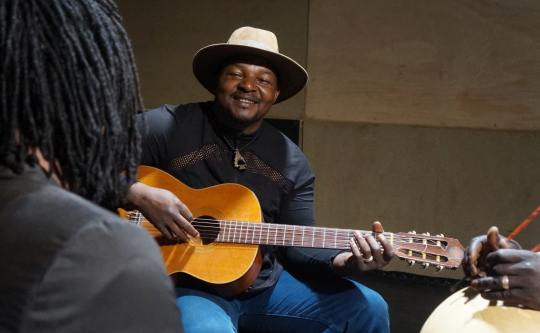|
There is something classic about the start of Samba Touré's new album Binga: a solitary electric guitar plays a repeated riff, then things begin to build as in turn an acoustic guitar, hand-drums, the lead vocal and finally backing vocals join the proceedings. It's an old device but in the right hands it can still draw you in and make you just want to stick around. It certainly works here. That same guitar riff carries on throughout the number, bedding everything into a hypnotic groove until all of a sudden it just stops, leaving you wanting more. “Tamala" is a very old song, well known to Touré's Songhai people and recounts exploits of the great figures of the Songhai empire, a bit of information we learn from the helpful notes which accompany each track listing.
The album title Binga refers to the region just south of the Sahara where Samba Touré grew up before moving to Bamako to find work. The material here reaffirms his continuing connection with these roots and as he has said himself: “Even if it’s complicated or dangerous to travel to the north now, it’s still my homeland and always will be. I have a house there. It’s my culture and my heritage. This is my region and it felt right to name this album after it. It’s pure Songhai music.”
Whilst the album begins and ends with traditional songs, the rest are originals, mostly songs commenting on social issues including education and migration. The tragic events that have torn Mali apart in recent years, creating widespread suffering and deprivation, are the backdrop to Touré's music and his songs lament the repercussions this has had on his people. “Atahar” is a desperate plea for some improvement in the state of education in schools.
“Sambalama” (video below) is faster paced, with an upbeat, celebratory tone. The outlook presented here is a more positive one, with Touré declaring that despite all the mounting setbacks he is looking forward to better times ahead.
All of the songs are sung in the Songhai language, a departure from Touré's previous albums. Musically, Samba Touré continues to develop the style he learnt from his mentor Ali Farka Touré who was such an encouragement to him when he started out. Some have cited Samba as the natural successor to the old master, but he has shown that he's his own man with his own voice and that is certainly in evidence here, while at the same time he continues to honour his musical heritage.
All the tracks reflect the interwoven cultural influences at the heart of what has become known as desert blues with some featuring blues harmonica played by guest contributor Richard Shanks, which, as might be expected, fits in perfectly. He can be heard on “Instrumental," usefully identifying itself as the only track to have no vocals. It was apparently an unplanned take from the last day of recording, the piece having grown out of a tuning-up session in the studio.
Apart from the appearances of Shanks, the main melodic interplay is between Touré's guitar and the fine ngoni playing of Djimé Sissoko. Instrumentally, it is kept sparse and this stark, minimal quality is aided by a symathetic, spacious production. Binga is a strong and assured album from Samba Touré.
|
